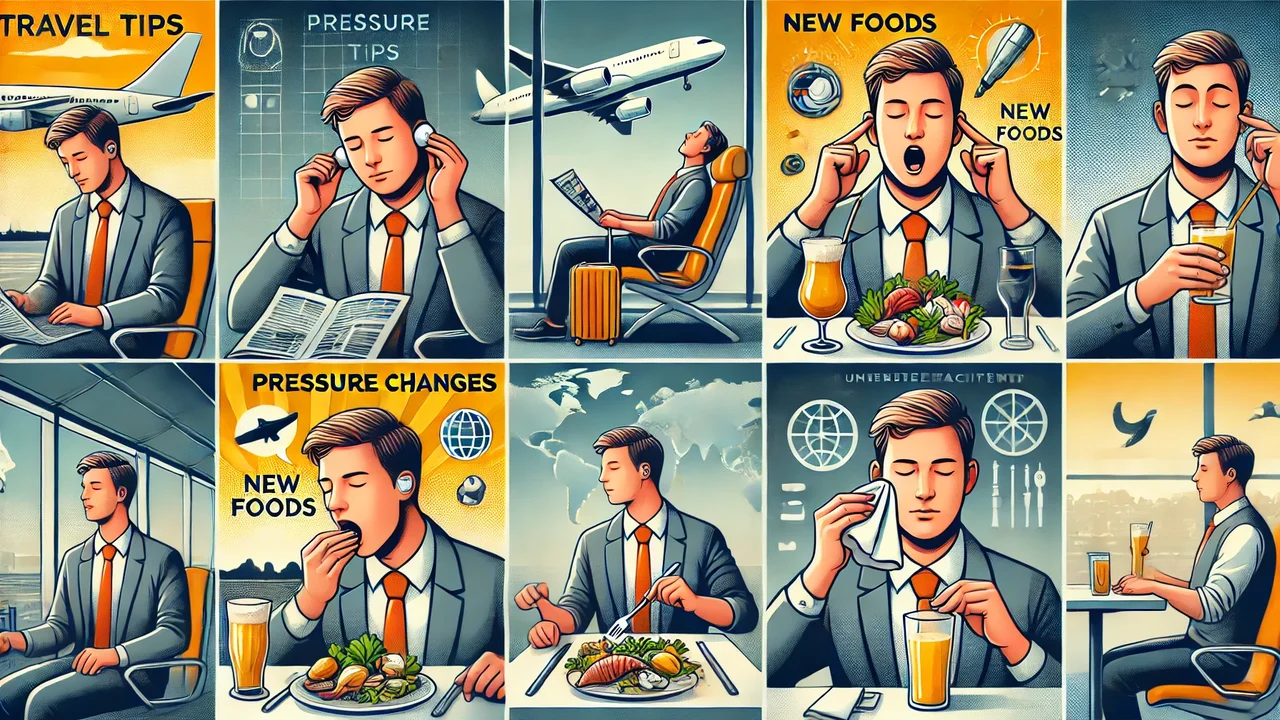Traveling is an exhilarating experience that broadens horizons, enriches perspectives, and creates lasting memories. However, alongside the excitement, there are challenges travelers often face—pressure changes during flights, unfamiliar cuisines, and unforeseen accidents. This guide is crafted to help you smoothly handle these common travel hurdles and ensure your journeys remain enjoyable and stress-free. Whether you’re a seasoned globetrotter or planning your first big trip, these tips will arm you with the knowledge needed to tackle whatever comes your way.
Understanding Pressure Changes During Flights
Flying can be thrilling, but pressure changes at high altitudes can cause discomfort. Understanding why this happens is the first step to managing it. During ascent and descent, the cabin pressure fluctuates. This can lead to ear popping, sinus pain, or even headaches. Knowing what to expect can ease anxiety and help you prepare.
To combat these effects, hydration is crucial. Drinking plenty of water helps maintain fluid levels and prevents dehydration, which can exacerbate the symptoms. Additionally, chewing gum or swallowing during takeoff and landing can equalize the pressure in your ears. For those prone to sinus issues, a saline nasal spray could provide relief, keeping nasal passages moist and reducing pressure.
Proper breathing techniques can also be beneficial. Practice deep-breathing exercises to stay calm and reduce stress. Inhale slowly through your nose, hold your breath briefly, and exhale through your mouth. This method not only helps with pressure adjustment but also enhances relaxation during the flight.
Managing Unfamiliar Foods While Traveling
Sampling local cuisine is a highlight of traveling, but it can sometimes lead to digestive surprises. To enjoy new foods without worry, start by researching typical dishes before your trip. Understanding key ingredients helps you make informed choices and avoid items that may upset your stomach.
Begin with small portions when trying something new. This gradual introduction allows your digestive system to adjust and reduces the risk of discomfort. If you’re unsure about certain foods, consider eating at places recommended by locals or travel guides for safer dining experiences.
Always carry basic digestive aids like antacids or probiotics. These can be lifesavers if your stomach reacts poorly to unfamiliar spices or cooking methods. Also, ensure you wash your hands frequently and use a hand sanitizer to prevent contamination.
Preparing for Unexpected Accidents on the Road
Accidents are unpredictable and can range from minor inconveniences to serious issues. Preparing for these events can alleviate stress and ensure you stay safe throughout your travels. Start with a comprehensive travel insurance plan that covers medical emergencies, theft, and unexpected cancellations.
Create a travel first-aid kit tailored to your needs. Include essentials like band-aids, antiseptic wipes, pain relievers, and any personal medications. It’s also wise to note down emergency contacts and locate nearby medical facilities upon arrival, such as an emergency dentist in South Jordan if you’re visiting that area.
Learn basic first-aid skills before your trip. Knowing how to treat minor cuts, burns, or sprains can be invaluable. Many organizations offer short courses, and this knowledge will boost your confidence in handling unexpected situations.
Staying Healthy and Fit While Traveling
Maintaining physical health while traveling can enhance your experience and keep energy levels high. Prioritize sleep by setting a regular schedule and creating a restful environment. Use earplugs or a sleep mask to minimize disturbances and ensure quality rest.
Incorporate physical activity into your itinerary. Whether it’s a brisk walk through a scenic park or a quick hotel room workout, staying active can counteract travel fatigue and improve mood. Even small efforts, like taking stairs instead of elevators, contribute to overall well-being.
Mindful eating also plays a role in health maintenance. Balance indulgence with nutrients by incorporating fruits, vegetables, and proteins into meals. If possible, prepare simple snacks like nuts or yogurt to have on hand for healthy options.
Building Resilience Against Travel Stress
Travel stress is common but manageable with the right strategies. Start by organizing your itinerary, ensuring a buffer for unexpected delays or changes. Planning ahead reduces uncertainty and allows for a more relaxed experience.
Practice mindfulness techniques to stay grounded. Meditation, journaling, or yoga can help maintain mental clarity and reduce anxiety. Even a few minutes of deep breathing can refocus your mind and ease tension.
Stay connected with loved ones through regular updates or video calls. Sharing experiences and receiving support from friends or family can provide emotional comfort and make travel feel less isolating.
Exploring Culture with Respect and Curiosity
Engaging with local cultures enriches travel experiences and fosters mutual respect. Approach interactions with an open mind and a genuine interest in learning. Educate yourself on cultural norms, practices, and etiquette to show respect and avoid misunderstandings.
Language barriers can be daunting, but basic phrases in the local language can go a long way. People appreciate efforts, no matter how small, to communicate in their tongue. Carry a phrasebook or use language apps to facilitate conversations.
Participating in cultural activities, like festivals or workshops, offers insights into local life and traditions. Whether it’s a cooking class or a traditional dance performance, immerse yourself fully for a richer experience.
Sustainability and Responsible Travel Practices
Traveling responsibly ensures destinations remain beautiful and accessible for future generations. Adopt sustainable practices like using refillable water bottles, minimizing waste, and supporting eco-friendly accommodations.
Be conscious of your carbon footprint by choosing public transport, cycling, or walking when possible. These options not only reduce environmental impact but also offer unique ways to explore new places.
Support local businesses by purchasing souvenirs or dining at locally-owned restaurants. Contributing to the local economy enhances your travel experience and helps sustain communities.
Conclusion
Traveling is a rewarding adventure, filled with new sights, sounds, and tastes. By preparing for pressure changes, trying new foods cautiously, and being ready for unexpected incidents, you can focus on what truly matters—the joy of exploring the world. These tips not only enhance your travel experience but also equip you with skills and knowledge that transcend borders. So, pack your bags, keep these strategies in mind, and set off on your next unforgettable journey with confidence!

Stephen Norman is a skilled and accomplished writer known for his versatility across numerous niches. He consistently delivers insightful and engaging content in various fields. Stephen’s extensive experience and profound expertise make him a highly sought-after author in the digital writing sphere.











